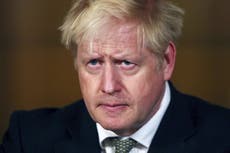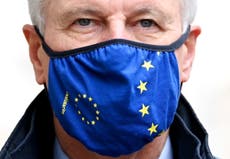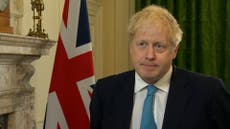Boris Johnson will cave over Brexit in the next few weeks – and then try to sell it as his original plan
Luckily for the prime minister and the Tories, even a ‘sell-out’ agreement has multiple political benefits. It may even make his administration look half-way competent

Your support helps us to tell the story
From reproductive rights to climate change to Big Tech, The Independent is on the ground when the story is developing. Whether it's investigating the financials of Elon Musk's pro-Trump PAC or producing our latest documentary, 'The A Word', which shines a light on the American women fighting for reproductive rights, we know how important it is to parse out the facts from the messaging.
At such a critical moment in US history, we need reporters on the ground. Your donation allows us to keep sending journalists to speak to both sides of the story.
The Independent is trusted by Americans across the entire political spectrum. And unlike many other quality news outlets, we choose not to lock Americans out of our reporting and analysis with paywalls. We believe quality journalism should be available to everyone, paid for by those who can afford it.
Your support makes all the difference.Here’s some good news to come out if the pandemic; not even this government would risk the career-terminating consequences of a no-deal Brexit in the middle of nearer total lockdowns and a national economic crisis. They like to think they would; but the record and the intense pressures on them now suggest they will cave, probably in a couple of weeks. By that point, Donald Trump, the only fan of Brexit in Washington, will be heading out of the White House and back to Trump Tower. The US will swing in behind getting a deal. Johnson will suddenly feel very isolated in the world.
According to The Spectator – invariably an unimpeachable source on Downing Street’s impeachable activities – these theatrics about the Brexit talks are just that. We are informed: “There’s a reason why No 10 is always so inclined to ratchet up the tension. Downing Street’s staff, and particularly the Vote Leave alumni, believe that one of their strategies is that in high-pressure situations, they stay calm while others panic.”
Comically deluded as that might sound, there’s no doubt they do possess the arrogance to believe that that is what they are, a squad of cool hand Lukes playing poker with a load of hysterical continental types.
The truth of course is rather different. Boris Johnson and Michael Gove said they were ending trade talks on 15 October, come what may. Then they were ending them but would leave the door “ajar” – but only if there was a fundamental shift in the EU position. Then the EU said they’d like to negotiate – with no “fundamental” shift (whatever that means) promised. So the UK, yet again, panicked and caved but made it look like a triumph of statecraft. It was just the same with the oven-ready withdrawal agreement – going along with a border down the Irish Sea just as Michel Barnier has suggested (though later trying to wriggle away from its legal and logical forces). There is an even longer list of domestic U-turns and case studies in the Johnson way of statesmanship.
The great UK-EU free trade agreement will be no different. Johnson will in due course chuck the fisherfolk overboard, buckle to EU orthodoxy in state aid, compromise absolute sovereignty in the name of cooperation, declare victory and move on.
He will get away with it because some of the most powerful people in the cabinet, including Rishi Sunak and even Michael Gove are desperate to get one. In parliament, there will be the hard men and women of the ERG ready to vote the deal down, but they must be feeling a bit silly now, like the Japanese soldiers who emerged from various jungle islets in the 1970s and had to be persuaded that the war was over. Nigel Farage won’t be satisfied, but then it’s not his way, and he’d have nothing to do except watch migrants in dinghies if he ever accepted reality. Most important of all, the public has other things to worry about right now than the UK-EU level playing field disputes mechanism and whether the European Court might have a role in it, such as whether the medications they need that are made in a factory in Saarbrucken are going to make it across the channel. This will be “oven-ready deal 2”, and with public opinion supporting it if only out of sheer exhaustion. The hard Brexit constituency remains a minority, though admittedly well-represented in the Tory grassroots. But once it’s been signed what can they do? What’s their alternative?
Luckily for Johnson and the Tories a deal, even a “sell-out”, has multiple political benefits. First, the most important and selfish one: It will end for good the European divide which has obsessed, confused and divided the Conservative party, on and off, for six decades. No more Europhiles and Eurosceptics, then; no more factions; no more civil war; no more factionalism and chaos. It’ll actually be Labour and the SNP who’ll find Europe a tricky issue to navigate, with so many of them wanting to rejoin at the earliest opportunity. What a happy ending for the Tories!
Second, it’ll make the Johnson administration look halfway competent, something they really need.
Third, a deal, irrespective of terms, will help the UK stuck together, at least compared to no deal. The SNP will have to state their terms of EU re-entry, such as joining the euro and on fishing rights, and prove they’d be superior to staying in the UK with the EU FTA. There would be no need for any trouble over Ireland, provided the Democratic Unionists are betrayed for a scrubs time and the offensive provisions of the Internal Market bill are further weakened of quietly ignored.
Of course, time is very short and there isn’t enough time for about 30 different European parliaments and assemblies to ratify the deal. Imagine if the Walloons cut up rough again like they did over the Canada Deal! But there is a way around that. The transition period can still end on 31 December but tariff-free access to and from the EU (and not the rest of the world) can be continued under World Trade Organisation terms under the famous Article 24 rule that allows this if the two sides are negotiating a free trade deal and both agree to it. So the time could then be used to fine-tune the document and get the parliamentary processes completed, as well as for Johnson to try and backtrack a bit, just as he always tries to.
I’m afraid I can see it now, Johnson bounding out to the podium in Downing Street: “This is a fantastic free trade deal that will mightily be of benefit to every part of the UK and of course to our European friends and allies. It preserves smooth access to the vast European market and protects the Good Friday Agreement. Everyone should now leave the bitter disputations and fractious argument if the last five years get behind Global Britain. Our relationship with Europe is at long last settled. Our European neighbours will be free to continue to enjoy our delicious Welsh lamb and brilliant electric vehicles and we shall continue to enjoy their fine wines and other epicurean delights...and of course, we look forward to forging new complementary economic trade deals across the world as we have with Japan, and I shall be taking that very issue up with president Biden shortly...”
It will still be a flimsy deal dictated by Brussels from a position of extraordinary British weakness, far inferior to the UK’s old bespoke terms of membership, and Brexit will still cost jobs and living standards. But it will be a “deal” and one a weary, distracted, fearful British populace will be grateful for.






Join our commenting forum
Join thought-provoking conversations, follow other Independent readers and see their replies
Comments